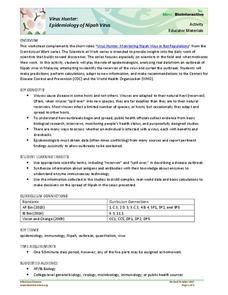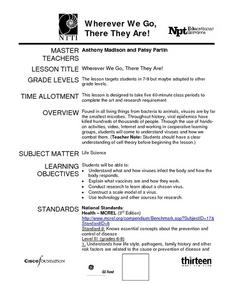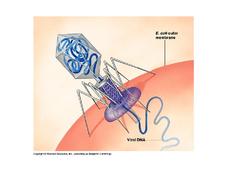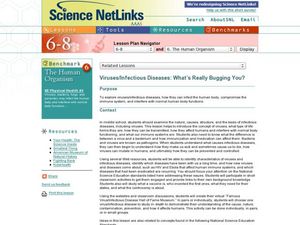Howard Hughes Medical Institute
Viral DNA Integration
How do viruses hijack our cells to produce more viral particles? Junior immunologists model how viral RNA integrates into a host cell's DNA using pop beads and use interactive tools to explore a virus' genome. The teacher's guide...
Howard Hughes Medical Institute
Virus Hunters: Epidemiology of Nipah Virus
Who actually goes looking for a virus? Expose your class to the high-stakes life of an epidemiologist on the trail of the Nipah virus. Pupils engage in a short video, then examine how scientists predict, model, and find the source of...
Cornell University
Bacteria Take Over and Down
Bacteria outnumber all other forms of life on Earth. Scholars observe the growth of bacteria in petri dishes to understand their role in maintaining good health. Then, they observe the growth of bacteria after they introduce...
Towson University
Chestnut Tree Lab
What will your class learn in a curious tale of a fungus, a virus, and a chestnut tree? Biology scholars discover the world of viral biocontrols through a DNA restriction lab. Groups research the decline of the American chestnut tree at...
Pearson
Immune System – Guarding Against Disease
Health fact: Washing your hands is one of the most important ways to protect your body from germs. Share this advice and many other tips for guarding against diseases such as the cold and flu virus with a colorful 73-slide...
Prezi
Virus Cell Life Cycle/Structure
Viruses were nano before it was cool to be nano. The presentation covers the structure of a virus cell and the life cycle of a virus. It also includes two videos illustrating the virus cell in greater detail.
Ask A Biologist
Viral Attack
Can you catch the same cold twice? Elementary and middle schoolers learn about what happens when a virus attacks their bodies, and how the immune system never forgets a virus, with an entertaining comic book. The packet includes...
Creative Learning Exchange
The Infection Game: The Shape of Change
Encourage the spread of knowledge in your class with this cross-curricular epidemic simulation. Pulling together science, social studies, and math, this lesson engages students in modeling the spread of infectious...
UNICEF
Knowing Your Risk for HIV/AIDS
What are the various ways people can become infected with HIV? Build awareness with your pupils and dispel common myths on the transmission of HIV with this resource, which includes a brainstorming activity, group discussion,...
The New York Times
Sequencing the Stages: Understanding H.I.V. Infection at the Molecular Level
How does HIV operate at the molecular level? Pupils discover the progression from a healthy immune cell to one infected with HIV, watch an animation of the HIV life cycle, and finally identify each of the stages with illustrations...
Smarter Balanced
Communicable Diseases
Pathogens, what they are, how they spread, and how to prevent them from spreading are the focus of this resource that can be used to prepare learners for a performance task assessment or to begin the study of communicable diseases.
Baylor College
The Variety and Roles of Microbes
Mini microbiologists play a card game in which they group microorganisms by groups: virus, fungus, protist, or bacteria. Then they identify the roles different microbes play in the natural world and explore how humans effectively use...
Curated OER
Introductory Bacteria and Virus Worksheet
Compare and contrast eukaryotes, prokaryotes, and viruses with a chart and a Venn diagram. Beginning microbiologists consider motility, reproductive ability, DNA content, and the presence of organelles. They write short answers to...
Curated OER
Bioterrorism: Development of a "Superbug"
Students compare bacteria and viruses and their roles in biotechnology and bioterrorism. They outline fundamental steps of bacterial transformation and the possible selection processes to identify transformants. They discuss...
Curated OER
Wherever We Go, There They Are!
The central video for this lesson is not available through the included resource link. However, the activity that simulates the passing of a virus through a population is impacting and the other resource links are invaluable. Use this...
Curated OER
Microbes
Sometimes the tiniest things can affect our daily lives. Learn all about the wonders of microbes. This excellent resource provides information on the types of microbes found in our environment, what they look like, and how they impact us...
Curated OER
Sexually Transmissible Diseases (STDs) - Day 1: Overview
Pages and pages of information on sexually transmissible diseases (STD). Vocabulary, worksheets, reference sheets, questions for discussion, and more. Transmission and reducing the risk of transmission of a STD. Signs, symptoms, and...
Curated OER
Science Jeopardy
Wow! Review an entire semester of biology curriculum playing this Science Jeopardy game! The variety of topics is extremely broad, so you will need to review each question to find if they all apply to your course. As you find material...
Curated OER
viruses
No title page for this presentation about single-celled processes and gene recombination means that your class would jump into a set of slides full of relevant and detailed information. There are many labelled images and diagrams,...
Children’s Hospital of Philadelphia
Case Studies: Influenza and HIV
Stop infection spread. Pupils participate in an activity to model infections and replications of viruses. Within the activity, scholars see that viruses may end up with genetic variation and connect that to how some forms of the flu are...
Curated OER
Viruses/Infectious Diseases: What's Really Bugging You?
Middle school life science or health classes listen to an audio, visit websites, read different articles, and participate in a class-wide simulation about the spread of viruses. The lesson doesn't get into the mechanics of how viruses...
Curated OER
Medical Help for Microbe Attacks
Students discuss sicknesses and how medications have been designed to combat microbial illnesses. They review microbial groups and learn more about treatment of microbial illness. After viewing the lab students conclude that antibiotics...
Curated OER
Small Pox Scare Wks 1-2
Pupils identify basic similarities and differences between B- and T-lymphocytes, stressing function, location, and role. They complete a worksheet that requires them to apply knowledge about ELISA and antibodies.
Curated OER
Viruses: Dead or Alive?
A brief presentation introduces viewers to the world of viruses. Viral structure, virus categories, and the lytic cycle are displayed. The first slide needs to include actual diagrams of viruses to make the structure clear. The final...

























